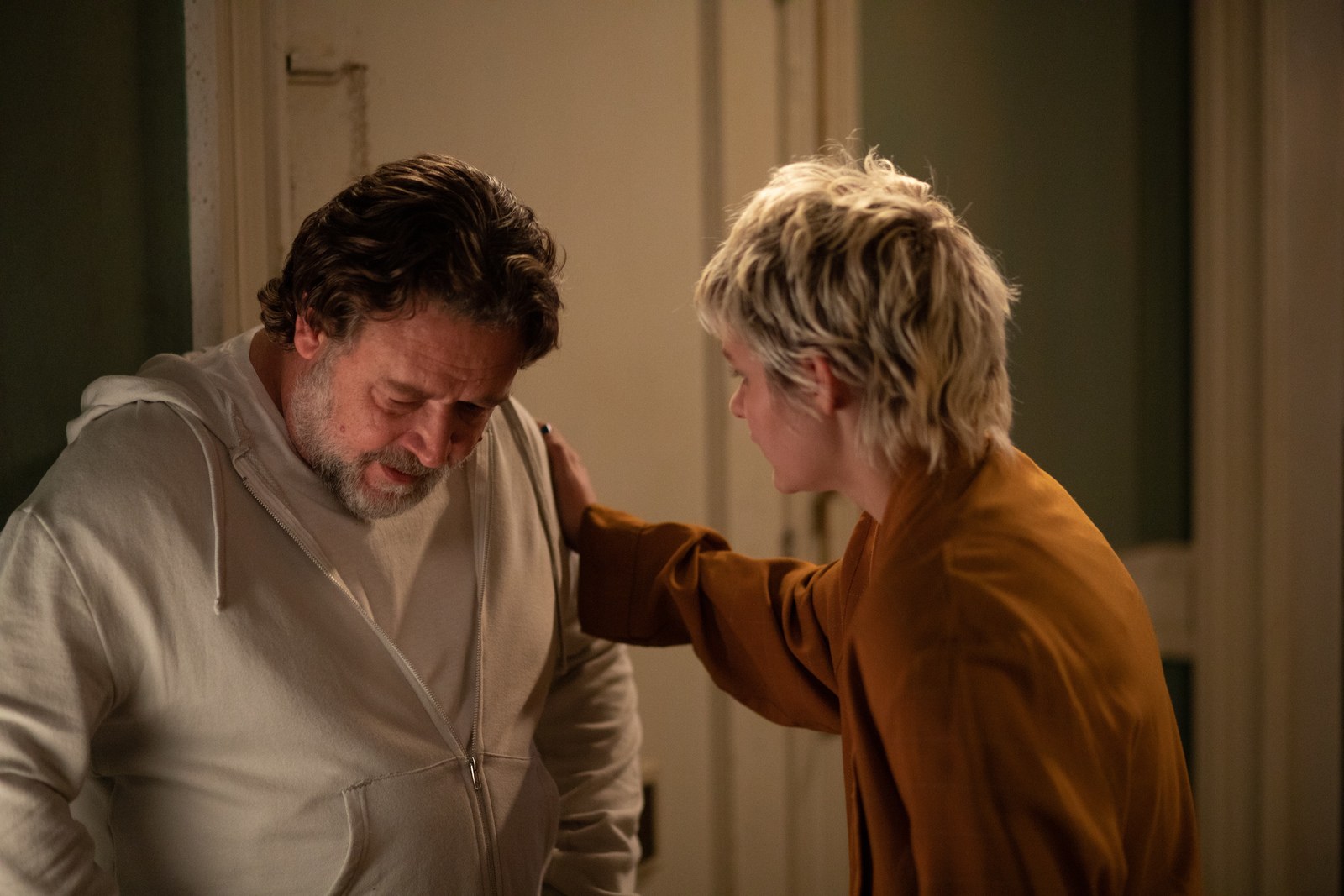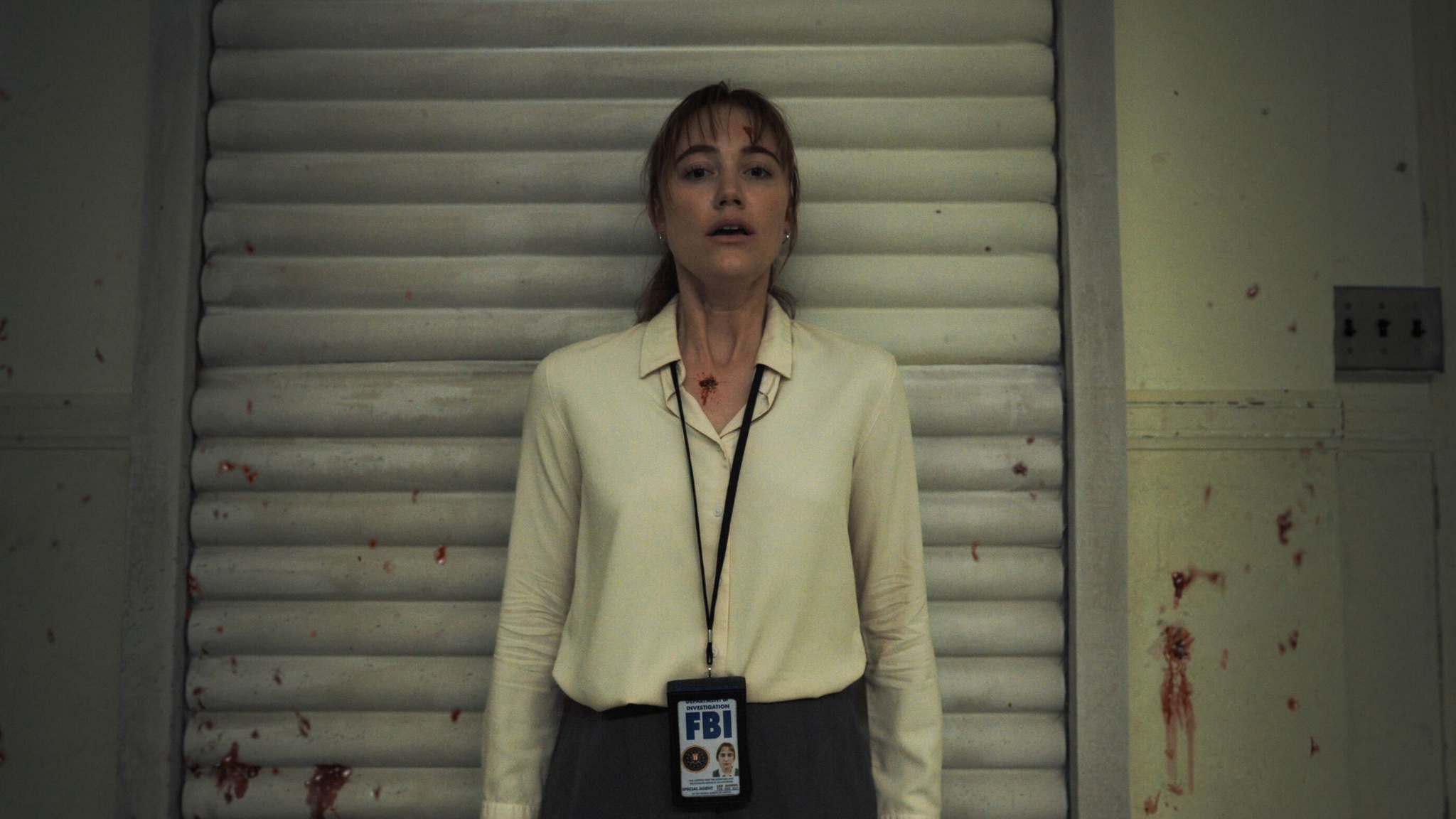
The Oscar-winner stars in yet another Exorcist ripoff that’s about as clever as its title: The Exorcism.
In The Exorcism, recovering alcoholic actor Anthony Miller (Russell Crowe) and his sixteen-year-old-daughter, Lee (Ryan Simpkins), are trying to reconnect at home and on the set of his comeback film, codename The Georgetown Project. That title (and the movie featuring it) is actually a thinly-disguised remake of 1973’s The Exorcist, which might explain the production appearing cursed and Anthony behaving strangely. After eighteen days of shooting, Anthony has a complete physical and psychological breakdown. Is he having a relapse or is there a supernatural explanation? Director Peter Dunn (Adam Goldberg) explains his concept for The Georgetown Project, which is a signal to the moviegoers about the movie’s true mission: ”a psychological drama wrapped in the skin of a horror movie.”
A holy film with holes.

It was a little over a year ago when Crowe played it straight as an exorcist in The Pope’s Exorcist. Audiences received that spooky romp with enthusiasm, but it was far from the best possession film of 2023 (try When Evil Lurks or Talk to Me instead). The Exorcism is unrelated to The Pope’s Exorcist, but probably hopes to benefit from the association. Kevin Williamson of Scream fame is a producer, which should tip off potential viewers that this is unlike other possession films and has a meta flavor: equal parts about making a film that provides commentary about the nature of the entertainment industry and is faithful to the horror genre. Sadly, this film is just lukewarm and fails to deliver on either front. The involvement of producers from the overstretched Halloween reboots and Blumhouse’s paper-thin Night Swim are better indicators of the quality of this film: disappointing and a waste of resources. Filmmaking life partners, director and cowriter Joshua John Miller and cowriter M.A. Fortin, fail to make a movie worth watching and over rely on their cast and the lore surrounding everything to be sufficient to satisfy viewers. Spoiler alert: it is not sufficient.
Visually, the movie within the movie recreates the grainy look that made William Friedkin’s horror classic one of a kind. Viewers familiar with cinematic history may enjoy The Exorcism more than others who just want to see the movie without doing homework on a classic horror film. There’s nothing wrong with paying homage to classics, but it must be cogent for everyone. The Cold Room, for example, is an artificially cold bedroom on the set that functions as ground zero for the source of the set’s supernatural problems. Without deep knowledge of the making of The Exorcist, throwing it into The Exorcism feels random. Without laying the groundwork explaining why The Georgetown Project’s set attracted this demon’s attention or creating a mythology to explain why films such as The Omen and Poltergeist were allegedly beset with unusual phenomenon, Fortin and Miller do not earn the supernatural notes in The Exorcism.
The movie also loses credibility when something physically harmful or a death occurs, and there is no hint of police presence or a single medic. Either this production is just invisible to the outside world or Miller and Fortin are throwing in a sci-fi twist they forgot to tell the audience. Any viewer might find it strange that a sixteen-year-old is living alone with her spiraling dad without anyone calling the Department of Children and Families. It’s possible that Miller is rebooting his auto/fiction novel turned film, The Mao Game, about a child star juggling trauma from child abuse, drug addiction and the death of a loved one from cancer, all themes addressed in his stab at horror. The real horror of this film is the parentification of Lee who is in danger of losing the only parent that she has, and she never even liked him that much. Let’s hope that in the future, Fortin and Miller eschew the theatrical gimmicks and revisit this concept.
A prayer for lost actors.

The real protagonist of The Exorcism is Lee, who lives with her father after getting kicked out of her school, St. Agatha. She is the fish out of water adjusting to living with her father, who was never her caretaker, and the callous showbiz industry. It’s disappointing that two gay men had a brilliant idea to make a lesbian into the hero but depict her in a diluted fashion complete with a blink-and-miss-it kissing scene between her and Blake (Chloe Bailey), a singer/actor who plays the possessed girl in The Georgetown Project. Only one big hint is dropped when she finally reveals why St. Agatha kicked her to the curb. Otherwise, her sexual orientation is otherwise danced around and could be rationalized as two girls around the same age striking up a friendship until the film approaches the denouement. The film never commits to Lee’s starring role for obvious reasons: if Crowe is on your payroll, lead with the star.
Crowe has compelling work to give, but it’s ultimately a wasted effort consisting of prose dumps disguised as confessions to off-screen priests or audition banter. As a survivor of childhood sexual abuse at the hands of a Catholic priest, losing his wife to cancer and his career to alcoholism, Anthony has plenty of reason to have crashed and burned, but it does not excuse his inadequacies as a husband and father. Fortin and Miller take the painful approach of constantly telling and not showing why the audience should root for him instead of just letting his actions speak for himself. There are haunting images alluding to Anthony’s childhood abuse which link communion wine to his present-day struggles with alcohol. Stunt casting does a lot of the heavy lifting since Crowe’s career has a parallel trajectory of being a well-respected, Oscar-winning actor with bad boy history now starring in movies only critically-acclaimed in the mirror universe. Fortin and Miller also missed an opportunity to truly depict a character that could be reverting to his toxic side after a couple of years of good behavior, which could be the aberration. Instead, they shy away from even the possibility that Anthony could be an unrepentant villain that we should not root for. All of that missed opportunity makes The Exorcism more frustrating and predictable.
David Hyde Pierce appears as the scruffy, mournful Father Conor, who serves as a consultant on the set. He’s also a psychologist who spends zero time getting a psych consult for Anthony. Despite his reassurances to the girls that demons are never involved, in practice, he jumps to demons as the source of all ills and prepares to exorcise Anthony without any assistance from his employer or thought to protect Lee and Blake. Pierce’s performance is so good that it is easy to imagine how much better the film would be if he was the protagonist entering an unfamiliar world and having to determine if these people were just eccentric, problematic or possessed. Though he spent years in television and even in film (mostly in comedies), Pierce has proven himself to be versatile in the sparse, serious movies that he appeared in (see The Perfect Host). It’s no surprise that only his fans should hold their nose and watch The Exorcism for him. He’s kind-of worth it.
Last rites.

The Moloch storyline is the weakest aspect of The Exorcism. Moloch is either a Canaanite god referenced in the Biblical book of Leviticus or a word used for child sacrifice, which should work within the context of this film on two fronts: the Hollywood industry devouring actors’ psychological well-being for success and the Catholic Church’s global sexual abuse cases and constant discovery of mass graves of indigenous people and at the Magdalene laundries. Moloch’s depiction in the film is of a literally bull-headed humanoid figure in a painting. When it possesses Anthony, he disassociates before becoming more verbally and physically abusive of his daughter. It’s true that survivors of sexual abuse do become perpetrators, but it is a lower percentage than once believed and is more likely to occur if a female perpetrator abused a boy. Cinematic demons are popular for uttering the foulest imaginable, usually sexually, explicit dialogue, and this Moloch turns Anthony into a potentially incestuous figure. Shocking it may be, but it also diverts the impact of the theme’s potential.
One of the pleasures of horror films is the ability to achieve catharsis by showing a character doing something that is morally wrong but is also subversively just. Think the burning of the bear-skinned boyfriend at the end of Midsommar. Possessed Anthony never gets that experience when he terrorizes people on set or at home, which is a missed opportunity. Fortin and Miller succeed at depicting Anthony as a person who is still a victim of vicious verbal abuse at the hands of his director. He is still that helpless adolescent, just older. Though Anthony is a bruiser compared to anyone else, he’s so helpless to his personal demons that his physical dominance is almost a nonissue when he’s not possessed. Even though Moloch clearly has no love for Peter and makes several attempts to kill him using inanimate objects, possessed Anthony never harms a hair on his head. That cheats the audience (and Anthony) of getting a moment of well-deserved vengeance. The movie’s cardinal sin is that it only kills innocents and not absolute jerks. It is such a humorless and joyless film without fully committing to bleakness by pulling punches when it comes to the resolution.
The bottom line.
If you ever face a situation where you must choose whether to watch The Exorcism or The Pope’s Exorcist, choose the latter. Even though the prior comes from a far more intelligent well, it is devoid of entertainment value and never fulfills the promise of its themes. Let’s hope that Fortin and Miller keep at it and do better the next time because there is gold in the ideas, not the execution.
The Exorcism is now playing in theaters everywhere. You can watch the trailer here.
Images courtesy of Vertical Entertainment. You can read more reviews by Sarah G. Vincent here.
REVIEW RATING
-
The Exorcism - 2/10
2/10






